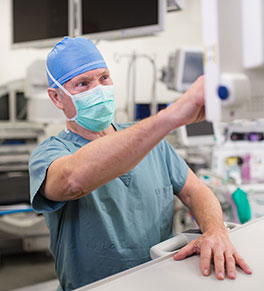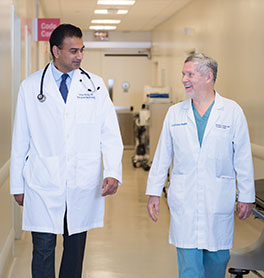The need for kidney transplants grows dramatically

When a person’s kidneys fail and their body can’t clear wastes and extra water, kidney dialysis or a kidney transplant are the only options. A record 23,401 U.S. kidney transplants were performed in 2019, but more than 90,000 people remained on a wait list. Nationally, 17 people die each day awaiting a compatible kidney.
UCI Health Kidney Transplant Services, Orange County’s oldest and largest, has more than doubled the number of transplants over the last four years to meet the community's need. Live Well asked Donald C. Dafoe, MD, professor and chief of transplantation and surgical director of the kidney program, about the surging demand.
Q. The program grew from about 25 to 50 transplants a year to the 125 your team performed last year. What’s behind those numbers?
A. When I was recruited four years ago, there was a strong foundation already in place to build upon. We had an expert nephrology team led by Dr. Uttam Reddy and skilled personnel. The group’s esprit de corps is excellent, and they excel in delivering personalized care to our patients. Plus, UCI Health’s reputation as an academic health system means that complex cases are referred to us.
Q. How long do people typically wait for a kidney transplant?
A. In California, with one of the longest wait times in the nation at up to 10 years, 19,600 people are seeking a compatible deceased donor kidney. In Orange County, the wait typically extends to eight years. We expect that recent changes in the national sharing system will soon make organs more widely available.
Q. Why do so many more people need a kidney transplant?
A. People are living longer and we are seeing increasing rates of obesity, diabetes and hypertension, which leads to higher rates of chronic kidney disease and more patients in need of dialysis. At UCI, we have more than 700 people with end-stage kidney disease on our wait list.
Q. Are kidneys from live donors better than those from deceased donors?
A. Live donors are the best option. With a live donation, a patient can get a transplant done within a few months. Organs from live donors are rejected less often and are more durable, so both short-term and long-term success are better.
Q. How many transplants do you perform using organs from live vs. deceased donors?
A. About 15% of transplants we do are from live donors, but that percentage is rising with the growth of our live-donor program and an increase in chain donations.
Q. What is a chain donation?
A. When blood and tissue typing show that a donor and recipient aren’t compatible, we can pair them with compatible patients and donors here and across the country. A national registry, which UCI Health recently joined, manages the chains, which can leapfrog across centers and long distances.
Q. You also perform donor-recipient swaps. How do those work?
A. Swaps involve donor-recipient pairs. If a donor and their recipient are incompatible, we search through our living donor paired-exchange program for another pair in the same situation. We have made viable exchanges in two, three and more compatible pairs at our center. We anticipate having more exchanges as members of the national registry.
Q. Why should someone consider making a live donation?
A. There is such a critical need for donor kidneys. When patients need a transplant, we ask if they have family or friends who might consider donation. A lot of patients are hesitant to ask, but many wonderful people do step up. Remember, even if there’s incompatibility, one donation can turn into a paired or chain opportunity.
Q. Why should people indicate their organ donation preferences?
A. Again, there is a critical shortage of kidneys. You can join California’s donor registry when you get or renew your driver’s license. In the case of an unexpected death, this can take the burden off family members who may be in shock when asked to make decisions about donation. We have seen many grieving families find solace in knowing that their loved one’s organs will help others.
Q. Is the expanded transplant program saving more lives?
A. Definitely. But it’s not just about longevity. We’re also greatly improving the patient’s quality of life. Transplant patients have more freedom in terms of diet and even travel now that they aren’t spending hours in dialysis three or four times a week. They also have more energy and think more clearly.





